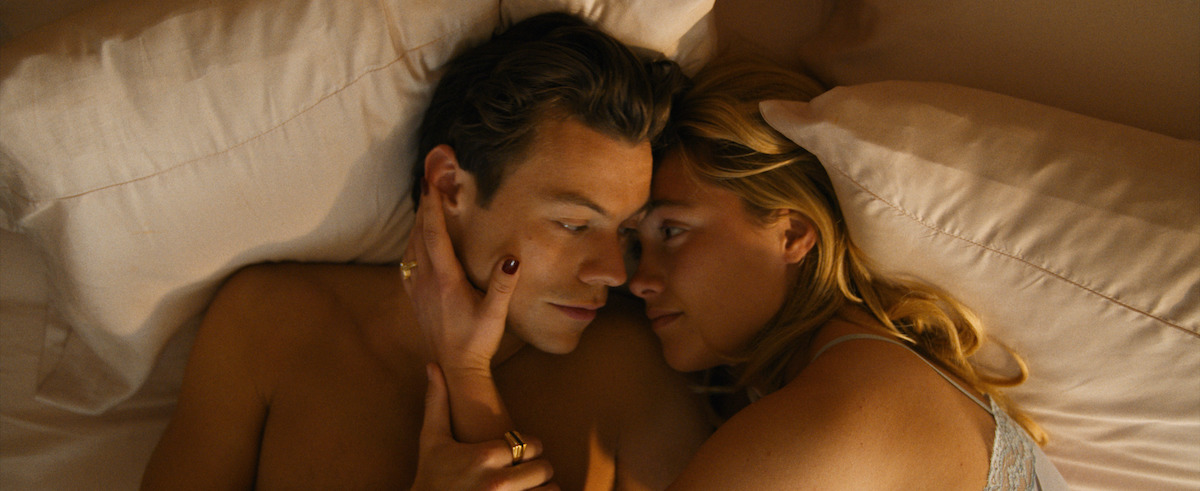
It’s almost impossible to talk about Don’t Worry Darling without discussing all that other stuff. If you don’t know stuff I’m referring to, congratulations, you are not among the ranks of the very online, and I salute you. (I do have some questions though, like: How? And can you teach me your ways?)
But honestly, I don’t want talk about that stuff—Google it; trust me, there’s ample reading material—I want to talk about the film itself, which I think is getting a bit of a bum rap (as we speak, it’s sitting with a less than glittering 37-percent “Fresh” on Rotten Tomatoes). I have a few theories why: It’s at least partly because it debuted at the Venice Film Festival which gave it a patina of “prestige film” and “Oscar contender” that it can’t quite live up to. (Okay, the production and costume design does have a shot at gold glory.) I also think people got sick of reading about the controversy and took it out on the film. Finally, and I’m just going to say it, there seems to be a bit of gleefully misogynistic scorn being heaped on director Olivia Wilde. How dare she leave the father of her children to date one of the world’s biggest sex symbols (a younger man!), and be a talented director? (Her debut, Booksmart, was the buzziest thing to come out of South by Southwest the year it debuted. The internet giveth, the internet taketh away.)
Many critics have complained that the film follows the well-tread path of The Stepford Wives and its various imitators. True. But I’m here to tell you—that stuff is sadly as relevant as ever. And Wilde adds a clever, 21st-century twist to the proceedings.
The premise is, yes, familiar: Alice (Florence Pugh) seems to have the perfect mid-century American existence. She lives in a beautiful planned community called Victory with her foxy husband, Jack (Harry Styles). They have lots of great sex and really love each other. Every morning, Jack, along with every other member of this insular development, drives off in his perfectly polished car to do mysterious work in a dome-shaped compound that is off-limits to the wives. The wives, in beautiful cocktail dresses and aprons, wave in unison and go about their days. They shop, they lounge around the pool, they drink martinis and Manhattans, they take a curiously regimented ballet class led by Shelley (Gemma Chan), the wife of Victory’s founder, Frank (Chris Pine). Their only job is to keep the house clean and make sure a delicious meal and the promise of sex is waiting for their husbands when they get home. Everyone’s happy, right?
Not quite. For one, Alice is plagued by flashes of something—memories? hallucinations?—that rattle her. Her next door neighbor, Margaret (Kiki Layne), is deeply depressed and tries to convince Alice that something is horribly amiss, even dangerous, in Victory. The other women gossip about Margaret, say she has become hysterical. (The specter of women being called hysterical is raised many times in the script—the kind of gaslighting that has powered many a thriller.)
The Frank character is guru of sorts, idolized by the husbands. (In one scene, he arrives at a party without a tie and all the husbands hastily begin to yank off their own ties.) He speaks in platitudes about the heroism and greatness of what they’re doing, without ever getting into specifics. He talks about how much the husbands need the wives—for their support, their love, and “most of all, their discretion.” Wilde has revealed that she modeled the character a bit off of men’s rights activist Jordan Peterson, and as the film goes on, that comparison becomes more apt.
Alice becomes increasingly paranoid. At one point, she cracks open one egg after the next, but they are all empty. At another point, she feels like the walls are closing in on her, literally. In one of the film’s best scenes, she deftly wraps her head in Saran wrap—a suicide attempt? Or something else? She tries to express her concerns to Jack, who cheerfully brushes her off, and later to her best friend Bunny (Wilde), who gets angry with her.
The performances are quite good. Florence Pugh is fast becoming one of my favorite actresses—she has a wonderfully expressive face and a frank sensuality. Chris Pine makes for a compelling villain—watchful, smart, and smugly self-satisfied. As for Harry Styles: I think he’s just fine. He doesn’t need to do much more than be a dreamboat—an idealized version of the devoted, hard-working husband who’s permanently hot for his wife—and he pulls that off convincingly.
Don’t Worry Darling is far from perfect. Alice has ongoing flashes of a Busby Berkeley-style choreography that never made sense to me. And the ending, while intriguing, feels a bit rushed.
If you think of Don’t Worry Darling as a stylish horror film rather than a searing exploration of our society’s gender politics, it works a lot better. That said, while the film isn’t adding anything new to the conversation about gender imbalance in our society, it’s a conversation we need to keep having. . . again. . . and again . . .and again.
